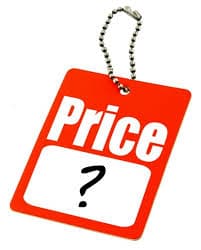Cheap? How can that be a problem?
The problem with pricing is that it’s based solely on perception. You may think having a cheaper product may get you a bigger slice of the market, but the moment your customers find that the competition is selling at 30-50% higher than your price, you’re in big doo-doo.
Instantly the customer perceives that you must somehow be inferior. And it doesn’t matter how much you know, doesn’t matter how much you talk about your product (or service), there is a clear perception that it can’t be as good.
But surely you can’t be too expensive, can you?
Expensive products drive away customers, don’t they? Well, not really. It’s less a factor of expensive vs. cheap and more of one of value. A customer will buy an expensive product or service not because they like blowing up money, but because it brings greater value.
If they sense that the more expensive product will bring them more new business, then they will somehow push, pull and try to get the more expensive version of your product or service.
Let’s take the time we bought bathroom tiles for instance…
So let’s say you’re faced with bathroom tiles that cost £30 a tile vs. £17 a tile. Which one are you going to buy? Seems like a no-brainer until the salesperson tells you that one has a far-greater chip resistance than the other.
This means that while you’re out of your shower and you accidentally drop something on the bathroom floor, you’re not going to need to call in the tiler, replace the tile, etc. Suddenly the more expensive product isn’t so very expensive after all.
The price often hinges on one blunt question:
This product/service costs 35% more than it’s closest competitor. Would you like to know WHY?
This bed is £5000 and that one is £4000. Would you like to know WHY?
This insurance policy is 15% more expensive than that insurance policy. Would you like to know WHY?
And of course the customer wants to know why, but we all ramble
We then proceed to give the customer too much information. “Oh, we have better blah, blah, blah. And our service is blah, blah, blah”. The blah, blah, blah drowns out what you really need to get across.
The guy selling the bathroom tiles could have blahed on but he chose to stick to the “chip resistance factor” and why it would be smarter to pay a higher price now, than have to deal with a whole bunch of nonsense later.
You cannot, simply cannot afford to blah
You need to know, preferably in a single line or two why this bed is better than that bed. Why this service is better than that. Why this insurance company seems expensive but is far superior. And you need to nail that WHY down to a single point. Not two points, not three-yup, just ONE. Tell the customer why it’s important and then be quiet.
In person this works just fine and it works if you’re selling online, too
You want to compare your products with other products. You want to drive home that your services are higher and how much higher than the competition. The higher prices don’t always drive customers away. If you’ve done your job well, your customer will work out how to get your product instead of the competitors.
But what if you lose the customer?
You do lose customers, you know. They do find a cheaper price alluring. Then they buy the inferior product or service. But in the back of their minds they’re usually waiting for the chance to upgrade. And when they’re ready, they know exactly where to go. Or sometimes bad things happen.
They join a writing course, and experience how it sucks. They buy a tile and hate looking at that stupid chip. They buy an insurance policy only to realise that it’s riddled with more holes than Swiss cheese. And they only have to make the mistake once before they head right to your door.
So even if the customer walks away today, you’ve not really lost a sale, you’ve merely postponed it for later.
But being more expensive always helps…
Even if you’re merely 2% more expensive than the competition, it gives you the upper hand. It gives you a “snooty factor”. It gives you the pedestal to ask your customer the vital question of “would you like to know WHY our product/service is more expensive?” And so the advice to you is always to make your products more expensive in some way-even if by a little bit.
You never have to apologise for more expensive products or services
You just have to compare. And explain.
And yes, stick to ONE point.




Comments are closed.